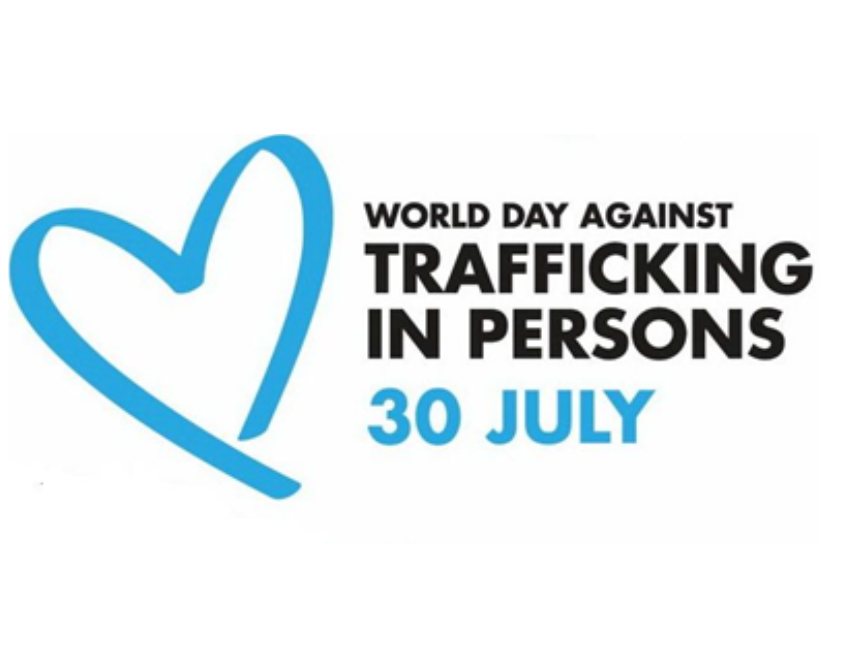World Day Against Trafficking in Persons

OnJuly 30th every year, the United Nations promotes World Day Against Trafficking Persons. Human trafficking is a form of modern-day slavery and involves every country on earth. Victims are coerced into sex trafficking or labor trafficking, usually under fraudulent pretexts. Although some victims are literally kidnapped from their homes, many are promised a chance to earn money to support their impoverished families, only to be sold into slavery by traffickers. Without income, identity documents and sometimes without knowledge of where they are, those who are thus enslaved become hopeless and fearful. Violence is also used to discourage any attempt at escape. In many countries, hotlines are available to call whenever we encounter a situation of suspected human trafficking. These hotlines allow anyone to report suspected trafficking anonymously so that law enforcement can investigate and arrest perpetrators. Also, laws are now being passed to protect the victims of trafficking, recognizing that whatever “illegal” activity they may be doing is coerced, and that they are thereby not responsible for actions performed under such duress. These laws protecting victims have encouraged some of them to come forward and report their situations to law enforcement officials. Many more efforts continue to be needed to put an end to this horrible crime. Those who profit from human trafficking must be held accountable if it is ever to end. This year’s global campaign for World Day Against Trafficking in Persons urges accelerated action to end child trafficking. Children represent a significant proportion of trafficking victims worldwide, with girls being disproportionately affected.
Additionally, children are twice as likely to face violence during trafficking than adults, according to the UNODC’s Global Report on Trafficking in Persons (GLOTIP). Regions such as Sub-Saharan Africa, North Africa, and Latin America and the Caribbean bear a disproportionate burden, with children making up for 60 per cent of detected trafficking victims.
Amid overlapping crises such as armed conflicts, pandemics, economic hardships, and environmental challenges, children are increasingly vulnerable to trafficking. Furthermore, the proliferation of online platforms poses additional risks as children often connect to these sites without adequate safeguards. Traffickers exploit online platforms, social media, and the dark web to recruit and exploit children, utilizing technology to evade detection, reach wider audiences, and disseminate exploitative content. The causes of child trafficking are as diverse as the ways in which children are exploited.
Children are subjected to various forms of trafficking, including exploitation in forced labor, criminality or begging, trafficked for illegal adoption, recruitment into armed forces, and online and sexual abuse and exploitation.
Root causes are manifold, including poverty, inadequate support of unaccompanied children amidst rising migration and refugee flows, armed conflicts, dysfunctional families, and lack of parental care. Notably, in low-income countries, children are often trafficked for forced labor, whereas in high-income countries, sexual exploitation remains prevalent among child victims.
Identification and protection of child victims remain challenging due to underreporting, lack of awareness, and inadequate resources for victim support services. Traffickers often employ coercion, deception, and threats to maintain control over their victims, making it difficult for authorities to intervene.
To effectively combat this scourge, concerted efforts are needed at both national and international levels. States must prioritize child protection, bolster legislation, improve law enforcement, and allocate more resources to combat child trafficking. Prevention efforts should target root causes like poverty and inequality to reduce children’s vulnerability. Special attention must be paid to trafficking of children on the move. Strengthening child protection systems and implementing child-sensitive justice mechanisms are crucial for supporting victims and holding perpetrators accountable. Addressing online child exploitation requires innovative strategies, collaboration between tech companies and law enforcement, and robust legal frameworks. Civil society organizations, the private sector, and communities have a vital role in raising awareness, providing support services, and advocating for policy reforms.
Holy One, we pray for an end to human trafficking. Give hope, courage and help to those caught in the snare of traffickers. Help them to seek and find a safe way out, so that they can live in freedom and security. Change the hearts of those who enslave others against their wills. Help them to see the dignity and humanity of every person and to reject coercion, violence and exploitation of the most vulnerable among us. Open our eyes to see, report and reach out to those being trafficked. Fill us with courage and compassion for those suffering from modern-day slavery.

